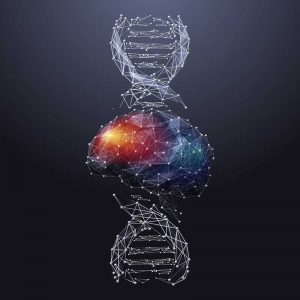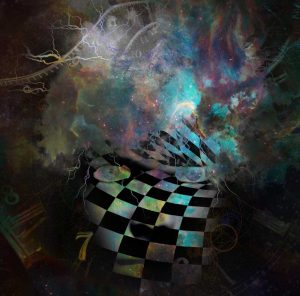Let Your Brain Out of the Box: Identifying the Old Paradigm
Science shows that we have HUGE potential and that we are only tapping into a tiny fraction of that potential that is within us. We are perceiving only 1% of the physical reality around us. We are using only 3% of our DNA to actively code for proteins.

We are using just 10% of our brain capacity for conscious processing and activities. All of the rest of our potential, which is a large majority, is untapped for most people. This potential is not there for no reason. It is there for us to grow into.
So, what is in the way of us accessing more of our potential?
We propose that it is largely an issue of mindset. We have been conditioned into a limited mindset that prevents us from expanding into our greatness. What is this box we have been conditioned and indoctrinated into that has trapped us into a very limited way of operating?
So what is this old box?
To put it simply, the old box is the mechanical way of thinking that is left over from the Industrial Age. The old mechanistic way of thinking is limited, linear and based on pure logic and a material worldview.
It’s roots go back to the paradigm adapted from Newtonian physics, which is several hundred years old and is what sparked the Industrial Revolution.
Before we reveal the problems with this old paradigm, we first want to credit Isaac Newton for the good his genius brought to our world.
The work he brought through at that time was revolutionary. It kicked off a major revolution and from it came the Industrial Revolution, which made way for many good technologies that we have today.
His revelations took us out of an era of superstition and into the idea that we can really understand our world and harness these forces that are available to us.
What many people don’t realize is that Isaac Newton was actually an Alchemist.

In Science history teachings, this fact that he was an Alchemist has largely been swept under the rug. Although in more recent years it is being revealed again. In truth, Isaac Newton was trying to understand “the mind of God” rather than taking “God” out of the equation.
He had hundreds of volumes of journals on alchemy and personal thoughts regarding this matter of spirit and consciousness being essential ingredients in our physical world. Yet for all the alchemical work he dedicated his life to, what he has been most known for in the history books is one volume of papers he published beginning in 1687 referred to as Principia (a shortened version of the full title), where he gave his force equations describing moving objects and gravitation, which later became the foundation of classical mechanics.
While much good was sparked from these theories at the time, we now are at a point where we have grown beyond it. The classical paradigm is limiting us.
That old box is exactly what we need to get out of, and this is the first quantum leap we must now make. In order to make this leap out, it helps to have a clear sense of what the boundaries of this box are, so we can recognize what we must leap beyond.
So, what are the basic principles that the Newtonian paradigm was built upon?
Reductionism:
Reductionism is the idea that we can reduce a whole down to its parts.
For example, if we want to know what a human being is, we can look at the brain and what the brain does, the heart and what the heart does, the liver and what the liver does, and so on. Essentially, we can separate all the pieces out and understand what they do at their individual levels and then we think we know what a human being is.
So reductionism is the idea that a complex system can be reduced to the sum of its parts.
Determinism:
Determinism is the belief that everything runs on clockwork, that there are formulas and basic principles that, when given precise initial conditions, for example if you know where something starts, you can theoretically calculate it’s entire future.
Determinism is everything is working like clockwork. If there were some “all seeing eye” that knew the conditions of every particle in the universe, theoretically according to this model, it would know the entire future of the universe. In this concept, there is no “free will”. There is no conscious choice. There is no room for something new to come in and change that.
Separatism:
The third principle of Separatism states that different objects have boundaries and they are not connected if they do not share the same boundaries. Therefore, separatism says we are isolated in the universe.
It claims, we are separate from the stars, they don’t affect us; we are separate from each other; we are separate from what happens on the other side of the world; and the observer or experimenter is separate from the observed. A natural evolution of separatism was the Darwinian theory of “survival of the fittest.” This concept implied that if we are separate then there is something outside of us to distrust, fear, or struggle against. So the “survival of the fittest” idea, and the competition that comes from it, further compounded upon this paradigm of Separatism.
Realism:
This principle is based on the concept that this is a real and materialistic world.
Another way of looking at this is that you can only trust what you can sense with your five physical senses. I have to see it, hear it, feel it, taste it, or smell it. I have to be able to experiment on it. It must be physical and material and something I can experiment on or it doesn’t exist.
This concept, taken to the extreme, says that the only thing that is real is the physical.
In this view, consciousness and spirit are all in the imagination and do not really exist beyond being reduced to a bio-chemical process in the brain and body. Still to this day many scientists are trying to explain the essence of who we are and our conscious awareness as some epiphenomenon in the brain.
So what is the truth?

The truth is NONE of this is fundamentally correct.
At best, these classical theories are an approximation of how we experience natural phenomenon. But more and more is being revealed showing that the truth is far deeper, stranger, and more intricate than what these old Newtonian concepts would have you believe.
Where do we go from here?
The first step of transformation is to completely shatter the old form, the old box, the old structure, to break it apart into pieces, purify things to their most basic essence, and then see what pieces must be re-gathered into a new form.

